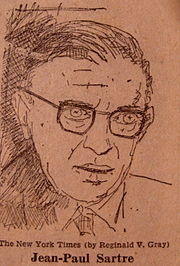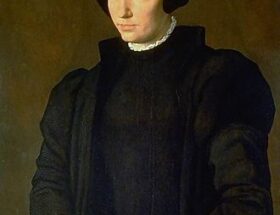
Early Years
Jean-Paul Sartre was born on 21 June 1905 in Paris as the only child of Jean-Baptiste Sartre, an officer of the French Navy and Anne-Marie Schweitzer. When Sartre was two years old, his father died of an illness, which he most likely contracted in Indochina.
Anne-Marie moved back to her parents’ house in Meudon where she raised Sartre with help from her father Charles Schweitzer, a teacher of German who taught Sartre mathematics and introduced him to classical literature at a very early age.
When he was twelve, Sartre’s mother remarried and the family moved to La Rochelle, where he was frequently bullied, in part due to the wandering of his blind right eye (sensory exotropia).
As a teenager in the 1920s, Sartre became attracted to philosophy upon reading Henri Bergson‘s essay Time and Free Will: An Essay on the Immediate Data of Consciousness.
He attended the Cours Hattemer, a private school in Paris. He studied and earned certificates in psychology, history of philosophy, logic, general philosophy, ethics and sociology, and physics, as well as his diplôme d’études supérieures (roughly equivalent to an MA thesis) in Paris at the École Normale Supérieure, an institution of higher education that was the alma mater for several prominent French thinkers and intellectuals.
It was at ENS that Sartre began his lifelong friendship with Raymond Aron. Perhaps the most decisive influence on Sartre’s philosophical development was his weekly attendance at Alexandre Kojève‘s seminars, which continued for a number of years.
From his first years in the École Normale Sartre was one of its fiercest pranksters. In 1927, his antimilitarist satirical cartoon in the revue of the school, coauthored with Georges Canguilhem, particularly upset the director Gustave Lanson.
In the same year, with his comrades Nizan, Larroutis, Baillou and Herland he organized a media prank following Charles Lindbergh‘s successful New York City–Paris flight. Sartre & Co. called newspapers and informed them that Lindbergh was going to be awarded an honorary École degree. Many newspapers, including Le Petit Parisien, announced the event on 25 May.
Thousands, including journalists and curious spectators, showed up, unaware that what they were witnessing was a stunt involving a Lindbergh look-alike. The public’s resultant outcryforced Lanson to resign.
In 1929 at the École Normale he met Simone de Beauvoir, who studied at the Sorbonne. The two became inseparable and lifelong companions, initiating a romantic relationship, though they were not monogamous.
The first time Sartre took the agrégation, he failed. He took it a second time and virtually tied for first place with Beauvoir, although Sartre was eventually awarded first place with Beauvoir second.
Sartre was drafted into the French Army from 1939 to 1941 and served as a meteorologist for some time. He later argued in 1959 that each French person was responsible for the collective crimes during the Algerian War of Independence.
From 1931 until 1945, Sartre taught at various lycées of Le Havre. In 1932, he discovered Voyage au bout de la nuit by Louis-Ferdinand Céline, a book that had a remarkable influence on him.
In 1933–34, he succeeded Raymond Aron at the Institut français d’Allemagne in Berlin where he studied Edmund Husserl‘s phenomenological philosophy.
The Neo-Hegelian revival led by Alexandre Kojève and Jean Hyppolite in the 1930s inspired a whole generation of French thinkers, including Sartre, to discover Hegel’s Phenomenology of Spirit.
World War
In 1939 Sartre was drafted into the French army, where he served as a meteorologist. He was captured by German troops in 1940 in Padoux and he spent nine months as a prisoner of war—in Nancy and finally in Stalag XIII-D, Trier, where he wrote his first theatrical piece, Barionà, fils du tonnerre, a drama concerning Christmas.
It was during this period of confinement that Sartre read Martin Heidegger’s Sein und Zeit, later to become a major influence on his own essay on phenomenological ontology. Because of poor health Sartre was released in April 1941. According to other sources, he escaped after a medical visit to the ophthalmologist.
Given civilian status, he recovered his teaching position at Lycée Pasteur near Paris and settled at the Hotel Mistral. In October 1941 he was given a position, previously held by a Jewish teacher who had been forbidden to teach by Vichy law, at Lycée Condorcet in Paris.

After coming back to Paris in May 1941, he participated in the founding of the underground group Socialisme et Liberté (“Socialism and Liberty”) with other writers Simone de Beauvoir, Maurice Merleau-Ponty, Jean-Toussaint Desanti, Dominique Desanti, Jean Kanapa and École Normale students.
In spring of 1941, Sartre suggested with “cheerful ferocity” at a meeting that the Socialisme et Liberté assassinate prominent war collaborators like Marcel Déat, but Simone de Beauvoir noted his idea was rejected as “none of us felt qualified to make bombs or hurl grenades”.
The British historian Ian Ousby observed that the French always had far more hatred for collaborators than they did for the Germans, noting it was French people like Déat that Sartre wanted to assassinate rather than the military governor of France, General Otto von Stülpnagel and the popular slogan always was “Death to Laval!” rather than “Death to Hitler!”.
In August Sartre and de Beauvoir went to the French Riviera seeking the support of André Gide and André Malraux. However, both Gide and Malraux were undecided and this may have been the cause of Sartre’s disappointment and discouragement. Socialisme et liberté soon dissolved and Sartre decided to write instead of being involved in active resistance.
He then wrote Being and Nothingness, The Flies and No Exit, none of which were censored by the Germans and also contributed to both legal and illegal literary magazines.
In his essay “Paris under the Occupation”, Sartre wrote that the “correct” behaviour of the Germans had entrapped too many Parisians into complicity with the occupation, accepting what was unnatural as natural:
The Germans did not stride, revolver in hand, through the streets. They did not force civilians to make way for them on the pavement. They would offer seats to old ladies on the Metro. They showed great fondness for children and would pat them on the cheek. They had been told to behave correctly and being well-disciplined, they tried shyly and conscientiously to do so. Some of them even displayed a naive kindness which could find no practical expression.
Sartre noted when Wehrmacht soldiers asked Parisians politely in their German-accented French for directions, people usually felt embarrassed and ashamed as they tried their best to help out the Wehrmacht which led Sartre to remark “We could not be natural”.
Sartre himself always found it difficult when a Wehrmacht soldier asked him for directions, usually saying he did not know where it was that the soldier wanted to go, but still felt uncomfortable as the very act of speaking to the Wehrmacht meant he had been complicit in the Occupation.
Throughout the occupation, it was German policy to plunder France and food shortages were always a major problem as the majority of food from the French countryside went to Germany. Sartre wrote about the “languid existence” of the Parisians as people waited obsessively for the one weekly arrival of trucks bringing food from the countryside that the Germans allowed, writing: “Paris would grow peaked and yawn with hunger under the empty sky. Cut off from the rest of the world, fed only through the pity or some ulterior motive, the town led a purely abstract and symbolic life”.
Sartre himself lived on a diet of rabbits sent to him by a friend of de Beauvoir living in Anjou. The rabbits were usually in an advanced state of decay full of maggots and despite being hungry, Sartre once threw out one rabbit as uneatable, saying it had more maggots in it than meat. Sartre also remarked that conversations at the Café de Flore between intellectuals had changed, as the fear that one of them might be a mouche (informer) or a writer of the corbeau (anonymous denunciatory letters) meant that no one really said what they meant anymore, imposing self-censorship.
Sartre and his friends at the Café de Flore had reasons for their fear. By September 1940, the Abwehr alone had already recruited 32,000 French people to work as mouches while by 1942 the Paris Kommandantur was receiving an average of 1,500 letters/per day sent by the corbeaux.
Paris had almost no cars on the streets during the occupation as the oil went to Germany while the Germans imposed a nightly curfew, which led Sartre to remark that Paris “was peopled by the absent”. Sartre also noted that people began to disappear under the occupation, writing:
One day you might phone a friend and the phone would ring for a long time in an empty flat. You would go round and ring the doorbell, but no-one would answer it. If the concierge forced the door, you would find two chairs standing close together in the hall with the fag-ends of German cigarettes on the floor between their legs. If the wife or mother of the man who had vanished had been present at his arrest, she would tell you that he had been taken away by very polite Germans, like those who asked the way in the street. And when she went to ask what had happened to them at the offices in the Avenue Foch or the Rue des Saussaies she would be politely received and sent away with comforting words” [No. 11 Rue des Saussaies was the headquarters of the Gestapo in Paris].
Under the occupation the French often called the Germans les autres (“the others”), which inspired Sartre’s aphorism in his play “No Exit” of “l’enfer, c’est les Autres” (“Hell is other people”).
After August 1944 and the Liberation of Paris, he wrote Anti-Semite and Jew. In the book he tries to explain the etiology of “hate” by analyzing antisemitic hate. Sartre was a very active contributor to Combat, a newspaper created during the clandestine period by Albert Camus.
Sartre and de Beauvoir remained friends with Camus until 1951, with the publication of Camus’s The Rebel. Later, while Sartre was labeled by some authors as a resistant, the French philosopher and resistant Vladimir Jankelevitch criticized Sartre’s lack of political commitment during the German occupation and interpreted his further struggles for liberty as an attempt to redeem himself.
In 1945, after the war ended, Sartre moved to an apartment on the rue Bonaparte which was where he was to produce most of his subsequent work and where he lived until 1962.
He ceased teaching and devoted his time to writing and political activism. He would draw on his war experiences for his great trilogy of novels, The Roads to Freedom (1945–1949).
Cold War
The first period of Sartre’s career, defined in large part by Being and Nothingness (1943), gave way to a second period of highly publicized political involvement. Sartre tended to glorify the Resistance after the war as the uncompromising expression of morality in action and recalled that the résistants were a “band of brothers” who had enjoyed “real freedom” in a way that did not exist before nor after the war.
Sartre was “merciless” in attacking anyone who had collaborated or remained passive during the German occupation. His 1948 play Dirty Hands in particular explored the problem of being a politically “engaged” intellectual. He embraced Marxism but did not join the Communist Party.
For a time in the late 1940s, Sartre described French nationalism as “provincial” and in a 1949 essay called for a “United States of Europe”.
About the Korean War, Sartre wrote: “I have no doubt that the South Korean feudalists and the American imperialists have promoted this war. But I do not doubt either that it was begun by the North Koreans”.
In July 1950, Sartre wrote in Les Temps Modernes about his and de Beauvoir’s attitude to the Soviet Union:
As we were neither members of the [Communist] party nor its avowed sympathizers, it was not our duty to write about Soviet labor camps; we were free to remain aloof from the quarrel over the nature of this system, provided that no events of sociological significance had occurred.
Sartre believed at this time in the moral superiority of the Eastern Bloc in spite of its human rights violations, arguing that this belief was necessary “to keep hope alive” and opposed any criticism of Soviet Union to the extent that Maurice Merleau-Pont called him an “ultra-Bolshevik”.
In 1954, Sartre visited the Soviet Union, which he stated he found a “complete freedom of criticism” while condemning the United States for sinking into “prefascism”. Sartre wrote about those Soviet writers expelled from the Soviet Writers’ Union “still had the opportunity of rehabilitating themselves by writing better books”.
Sartre’s comments on Hungarian revolution of 1956 are quite representative to his frequently contradictory and changing views. On one hand, Sartre saw in Hungary a true reunification between intellectuals and workers only to criticize it for “losing socialist base”. He condemned the Soviet invasion of Hungary in November 1956.
In 1964 after the death of Stalin, Sartre attacked Khrushchev’s “Secret Speech” which condemned the stalinist repressions and purges. Sartre argued that “the masses were not ready to receive the truth”.
In 1973 he argued that “revolutionary authority always needs to get rid of some people that threaten it, and their death is the only way”. A number of people, starting from Frank Gibney in 1961, classified Sartre as an “useful idiot” due to his uncritical position.
Sartre came to admire the Polish leader Władysław Gomułka, a man who favored a “Polish road to socialism” and wanted more independence for Poland, but was loyal to the Soviet Union because of the Oder-Neisse line issue. Sartre’s newspaper Les Temps Modernes devoted a number of special issues in 1957 and 1958 to Poland under Gomułka, praising him for his reforms.
Bondy wrote of the notable contradiction between Sarte’s “ultra Bolshevism” as he expressed admiration for the Chinese leader Mao Zedong as the man who led the oppressed masses of the Third World into revolution while also praising more moderate Communist leaders like Gomułka.
As an anti-colonialist, Sartre took a prominent role in the struggle against French rule in Algeria and the use of torture and concentration camps by the French in Algeria. He became an eminent supporter of the FLN in the Algerian War and was one of the signatories of the Manifeste des 121.
Consequently, Sartre became a domestic target of the paramilitary Organisation armée secrète (OAS), escaping two bomb attacks in the early ’60s.
He opposed U.S. involvement in the Vietnam War and, along with Bertrand Russell and others, organized a tribunal intended to expose U.S. war crimes, which became known as the Russell Tribunal in 1967.

His work after Stalin’s death, the Critique of Dialectical Reason, appeared in 1960 . In the Critique Sartre set out to give Marxism a more vigorous intellectual defense than it had received until then. He ended by concluding that Marx’s notion of “class” as an objective entity was fallacious.
Sartre’s emphasis on the humanist values in the early works of Marx led to a dispute with a leading leftist intellectual in France in the 1960s, Louis Althusser, who claimed that the ideas of the young Marx were decisively superseded by the “scientific” system of the later Marx.
In the late 1950s, Sartre began to argue that the European working classes were too apolitical to carry out the revolution predicated by Marx, and influenced by Frantz Fanon stated to argue it was the impoverished masses of the Third World, the “real damned of the earth”, who would carry out the revolution.
A major theme of Sarte’s political essays in the 1960s was of his disgust with the “Americanization” of the French working class who would much rather watch American TV shows dubbed into French than agitate for a revolution.
Sartre went to Cuba in the 1960s to meet Fidel Castro and spoke with Ernesto “Che” Guevara. After Guevara’s death, Sartre would declare him to be “not only an intellectual but also the most complete human being of our age” and the “era’s most perfect man”.
Sartre would also compliment Guevara by professing that “he lived his words, spoke his own actions and his story and the story of the world ran parallel”.
However he stood against the persecution of gays by Castro’s régime, which he compared to Nazi persecution of the Jews, and said: “In Cuba there are no Jews, but there are homosexuals”.
During a collective hunger strike in 1974, Sartre visited Red Army Faction member Andreas Baader in Stammheim Prison and criticized the harsh conditions of imprisonment. Towards the end of his life, Sartre began to describe himself as a “special kind” of anarchist.
Later life and Death
In 1964 Sartre renounced literature in a witty and sardonic account of the first ten years of his life, The Words. The book is an ironic counterblast to Marcel Proust. Literature, Sartre concluded, functioned ultimately as a bourgeois substitute for real commitment in the world.
In October 1964, Sartre was awarded the Nobel Prize in Literature but he declined it. He was the first Nobel laureate to voluntarily decline the prize and remains one of only two laureates to do so.
He said he did not wish to be “transformed” by such an award and did not want to take sides in an East vs. West cultural struggle by accepting an award from a prominent Western cultural institution. Nevertheless, he was that year’s prizewinner. After being awarded the prize he tried to escape the media by hiding in the house of Simone’s sister Hélène de Beauvoir in Goxwiller, Alsace.

Though his name was then a household word, Sartre remained a simple man with few possessions, actively committed to causes until the end of his life, such as the May 1968 strikes in Paris during the summer of 1968 during which he was arrested for civil disobedience.
President Charles de Gaulle intervened and pardoned him, commenting that “you don’t arrest Voltaire”.

In 1975, when asked how he would like to be remembered, Sartre replied:
I would like [people] to remember Nausea, [my plays] No Exit and The Devil and the Good Lord, and then my two philosophical works, more particularly the second one, Critique of Dialectical Reason. Then my essay on Genet, Saint Genet. … If these are remembered, that would be quite an achievement, and I don’t ask for more. As a man, if a certain Jean-Paul Sartre is remembered, I would like people to remember the milieu or historical situation in which I lived, … how I lived in it, in terms of all the aspirations which I tried to gather up within myself.
Sartre’s physical condition deteriorated, partially because of the merciless pace of work (and the use of amphetamine) he put himself through during the writing of the Critique and a massive analytical biography of Gustave Flaubert (The Family Idiot), both of which remained unfinished.
He suffered from hypertensionand became almost completely blind in 1973. Sartre was a notorious chain smoker, which could also have contributed to the deterioration of his health.
Sartre died on 15 April 1980 in Paris from edema of the lung. He had not wanted to be buried at Père-Lachaise Cemetery between his mother and stepfather, so it was arranged that he be buried at Montparnasse Cemetery.
At his funeral on Saturday, 19 April, 50,000 Parisians descended onto boulevard du Montparnasse to accompany Sartre’s cortege. The funeral started at “the hospital at 2:00 p.m., then filed through the fourteenth arrondissement, past all Sartre’s haunts, and entered the cemetery through the gate on the Boulevard Edgar Quinet”.
Sartre was initially buried in a temporary grave to the left of the cemetery gate. Four days later the body was disinterred for cremation at Père-Lachaise Cemetery and his ashes were reburied at the permanent site in Montparnasse Cemetery, to the right of the cemetery gate.


